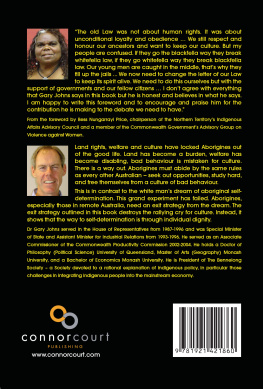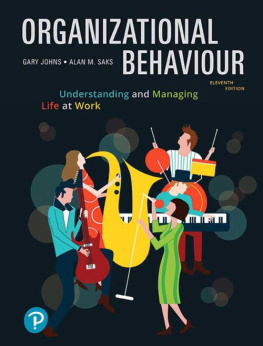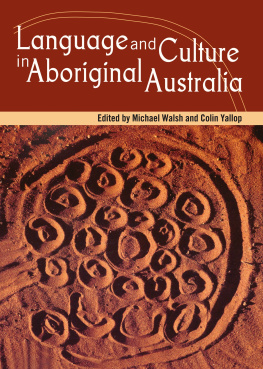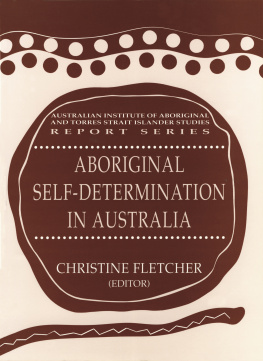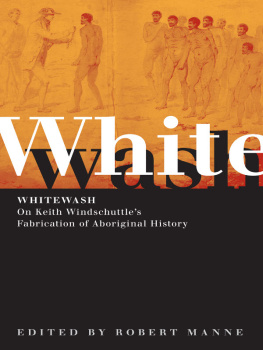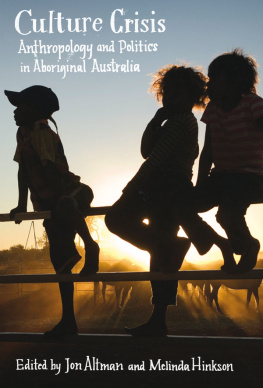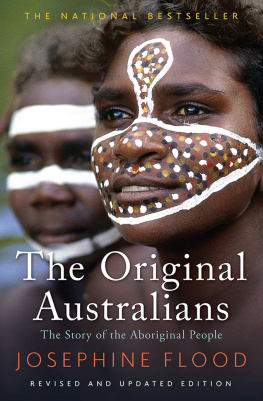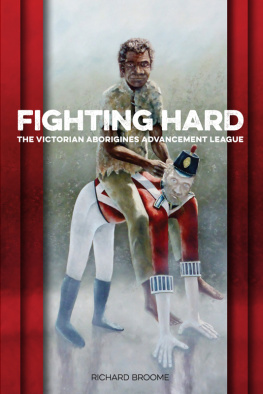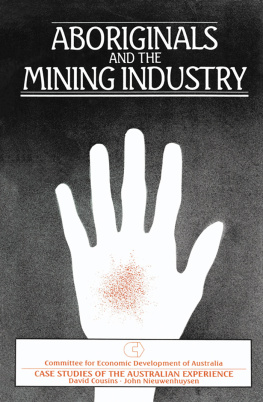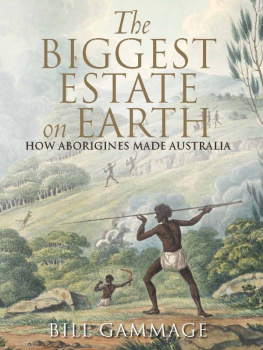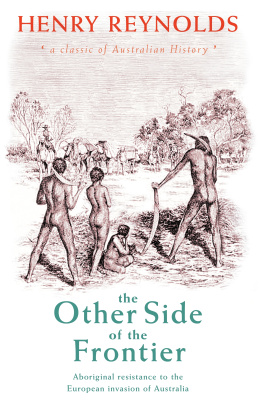ABORIGINAL
self-determination
THE WHITEMANS DREAM
ABORIGINAL
Self - Determination
THE WHITEMANS DREAM
GARY JOHNS
FOREWORD BY BESS NUNGARRAYI PRICE

Published in 2011 by Connor Court Publishing Pty Ltd.
Copyright Gary Johns 2011
Not to be reproduced without the permission of the Copyright holders.
All rights reserved.
Connor Court Publishing Pty Ltd.
PO Box 1
Ballan VIC 3342
www.connorcourt.com
ISBN: 9781921421860 (pbk.)
eISBN: 9781925138085
National Library of Australia Cataloguing-in-Publication entry
Subjects: Aboriginal Australians--Government policy.
Aboriginal Australians--Legal status, laws, etc.
Aboriginal Australians--Politics and government.
Dewey Number: 323.119915
Cover design by Ian James
Picture of Aborigine sitting on the flag by Paul Newman, first published in The Australian on 11 November 2010, used with permission.
The views expressed in this book are those of the author and do not reflect those of the Public Policy Institute or the Australian Catholic University.
Printed in Australia
Table of Contents
Authors dedication
I have worked with and through the Bennelong Society on Aboriginal policy for more than a decade. I would like to thank all members of the Society for their assistance, but especially the board with whom I have met on a monthly basis throughout the period. In writing this book, I have drawn on a number of the papers presented at Bennelong conferences and acknowledge these throughout the text. Most important are the insights of Pastor Paul Albrecht, formerly of Hermannsburg, and Rev Dr Steve Etherington, formerly of Oenpelli.
For their encouragement in the project and many and detailed comments on the book, I would like to thank Dr Ron Brunton, John Dawson, Rev Dr Steve Etherington, Dr Stephanie Jarrett, and John Nethercote.
I would also like to thank Dr Anthony Cappello and his team at Connor Court Publishing for encouragement in the project and professional competence in publishing.
Recently, I have befriended Bess Nungarrayi Price and Dave Price of Alice Springs. They have taught me a great deal about the ongoing struggle of Aboriginal people in remote areas to achieve equality with other Australians. Bess is an Aboriginal woman of exceptional strength. I hope that this book will assist her cause. Bess has been kind enough to write a Foreword.
In the early stages of preparing this book I asked my friend Peter Howson, vice president of the Bennelong Society, to write of his thoughts and involvement in Aboriginal policy. I felt time was of the essence and that it would be a record of his part in development of Aboriginal policy. It would also provide me with an opportunity to show my indebtedness to his work.
I have taken the liberty of sharing Peters thoughts by way of a Dedication.
Peter Howson died on 1 February 2009, aged 89. We miss him greatly but we are secure in the knowledge that his work was not in vain.
I am a lucky man. I have a wonderful and caring family. They have listened to my arguments and ideas for so long, and love me still. Thank you, Catherine, Elena, and Greta.
Gary Johns
President
Bennelong Society
December 2010
Foreword
Bess Nungarrayi Price
My mother and father were born in the desert. They taught me the old, sacred Law that our people lived by. It worked when we were living in tiny family groups taking everything that we needed from the desert. It was strong for sacred business and for marriage. Men had the power of life and death over their wives. Young girls were forced into marriage with older men. There was no law for property except that everything must be shared. There was no law for money, houses, cars, grog, petrol or drugs we didnt have any. The only way to punish was by beating or killing the law breakers. We had no army, police, or courts and only our family to defend us. Law Men used magic to heal or harm and kill.
Now we have a new law that is not sacred and doesnt believe in magic. We have property, houses, cars, grog, drugs, pornography. We live off welfare or we need to get a job to live. We still share everything. We cant say no to kin even if they waste our money or destroy themselves with it. Too many men still want the power of life and death over their wives. We dont plan for the future, budget or invest.
Too many of our kids are at terrible risk. Theres too much drunkenness, feuding, sickness, suicide, unemployment and despair. Our kids are not being educated properly in either law.
The old Law was not about human rights. It was about unconditional loyalty and obedience. Wise old people tried to make sure that there was justice. But even they couldnt deal with grog, drugs and violence. It all happened too quickly.
We still respect and honour our ancestors and want to keep our culture. But my people are confused. If they go the blackfella way they break whitefella law, if they go whitefella way they break blackfella law. Our young men are caught in the middle, thats why they fill up the jails. My parents understood that things were falling apart. My mother outlived eight of her eleven children. They understood the difference between the letter of the Law and its spirit.
We now need to change the letter of our Law to keep its spirit alive. We need to do this ourselves but with the support of governments and our fellow citizens. The time for shouting slogans and waving placards is over. We need to do some tough thinking and honest debating.
I dont agree with everything that Gary Johns says in this book but he is honest and believes in what he says. I am happy to write this foreword and to encourage and praise him for the contribution he is making to the debate we need to have.
Alice Springs
December 2010
Dedication
The Honourable Peter Howson, CMG
I have been actively concerned with Aboriginal affairs for 47 years, perhaps longer than any other person in government circles. Looking back it is clear that Aboriginal policy took a wrong turn in the 1960s. One group of Aborigines, those who were last to have contact with white society, have been cruelled by the experiment in Aboriginal self-determination.
I was first involved in Aboriginal policy as a member of the Parliamentary Voting Rights Committee in 1961; second, as Minister for Aboriginal Affairs from 1971 to 1972; and third, from May 1993 when I was asked by a Shadow Minister of the Federal Opposition to take a particular interest in formulating policy on Aboriginal affairs.
In gathering my thoughts I have been greatly assisted by several former Commonwealth public servants who have been in the Northern Territory for much longer than I have. I should single out two particularly. The first is Les Penhall, who joined the Northern Territory Public Service in 1940 as a patrol officer. He conducted his first patrol from Alice Springs to the Western Australian border on a camel in 1940. He had been in the department for over 30 years during which time I had known him. He saw a lot of hunter-gatherers as they were before they had really caught up with the movement of Australians into the remoter parts of the Northern Territory. He has been able to furnish me with a real idea of what the hunter-gathering existence was like. The other is Dr Ted (E P) Milliken, a psychologist, recruited Deputy Director of the newly-formed Welfare Department of the Northern Territory Administration under Harry Giese. He took up that job in 1954 and not only has a wealth of information at his fingertips, but he has also been able to explore the archives of that period, at least those archives that survived the 1974 cyclone in Darwin. I have been able to get access to the archives of that period to refresh my memory of all that took place between 1954 and 1971.
Next page
